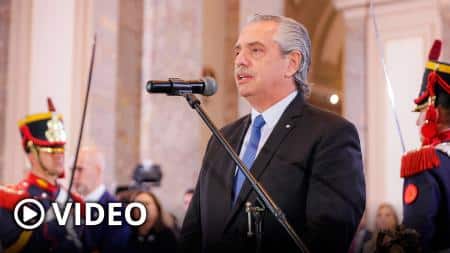Alberto Fernández called for building a “democratic coexistence”
VER VIDEO
President Alberto Fernández called this Thursday to “build a democratic coexistence” in the country and ratified “commitment to those who have less” by the National Government” during the Tedeum for May 25 that was held in the Cathedral of Buenos Aires.
“We have to build a democratic coexistence that we lack. It is clear that in diversity we think I disagree and we have different perspectives and aspirations for a different country, but we have all the commitments that you, Cardinal, have set for us. First, the last ones Pope Francis teaches us”, Fernández expressed when speaking at this traditional religious ceremony.
And I add: “I want to pray for the Pope (Francis), for you and for every Argentine so that once and for all we can build that unity that the cardinal spoke of. (the Archbishop of Buenos Aires Mario Poli in his homily). So that we can build a more just society together,” said Fernández.
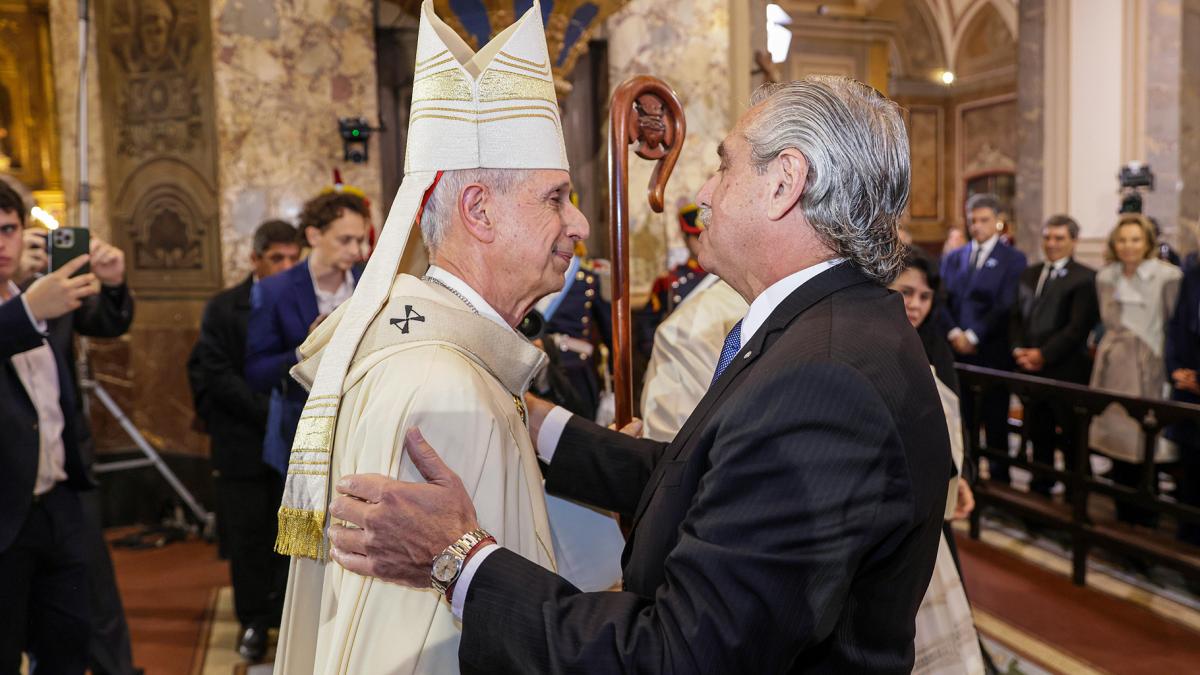 Photo: Presidency
Photo: Presidency
In this context, the president pointed out that it is his “last May 25 as President in this mandate” as well as that of the “dear cardinal” (who will conclude his priestly service this year) for what it meant for both a national date “different”.
The president also stressed that during this time he appealed “many times” to the Supreme Pontiff “because Argentina needed him.”
“The dear Pope was always helping. Today I make it public because he always did it in silence. I never stop helping”hill.
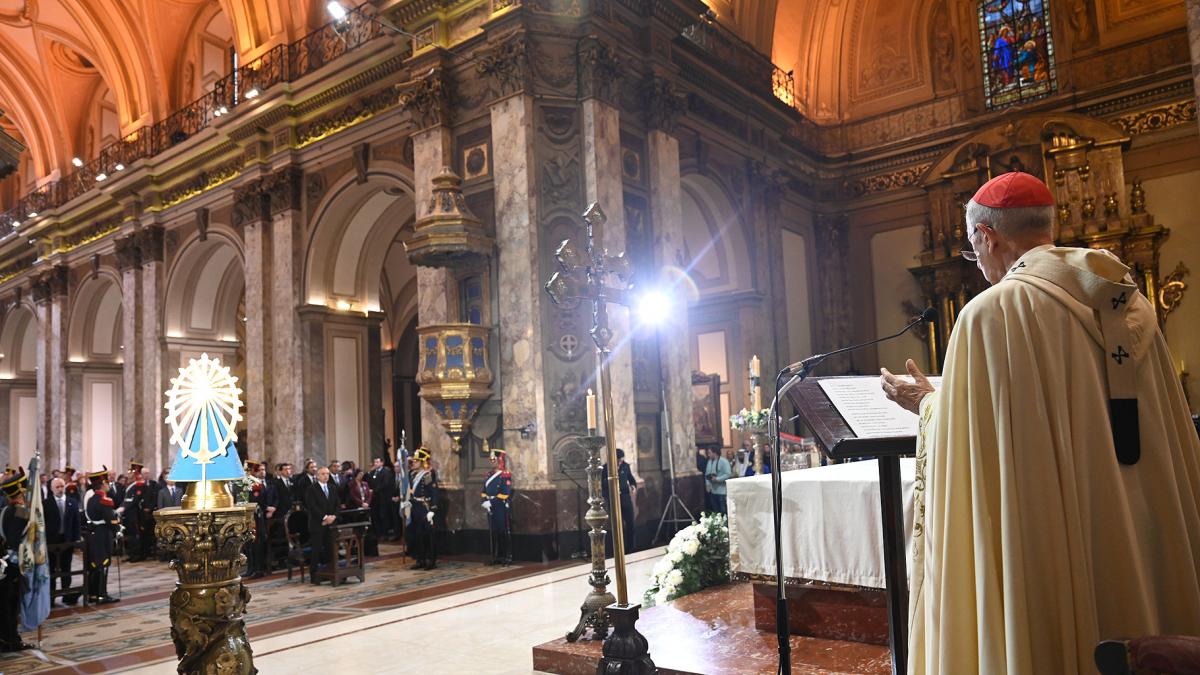 Photo: Presidency
Photo: Presidency
The arrival of the President
The President arrived at the Metropolitan Cathedral walking from the Government House, which is located almost 300 meters away, where he was greeted by the militancy that has been there since early hours to participate in the act that will be led this afternoon by Vice President Cristina Fernández de Kirchner, on the 20th anniversary of the presidential inauguration of Néstor Kirchner.
Along with Alberto Fernández, the Minister of Economy, Sergio Massa; the chief of staff, Agustín Rossi; The chancellor santiago cafiero; the Secretary General of the Presidency, Julio Vitobello; and the Secretary of Worship, Guillermo Oliveri.
Ministers also attended Edward ‘Wado’ Of Peter (Interior), Santiago Maggiotti (Territorial Development and Habitat), Raquel ‘Kelly’ Kismer of Olmos (Job); martin soria (Justice); Jorge Taiana (Defending); Diego Giuliano (Transport), Gabriel Katopodis (Public Works); and Victoria Toulouse Peace (Social Development), among other officials.
Prior to the start of the ceremony, Fernández spoke with the accredited journalists at Casa Rosada and told them that for him, the national date commemorated on this day “is a very special May 25” because it was “the last of this mandate.” .
“With which I celebrate it in a special way. It calls on all of us to rethink ourselves as a society. And it’s also a special day for me because 20 years ago we entered this Government House with Néstor (Kirchner) and I can’t stop remembering it, honestly”said the president,
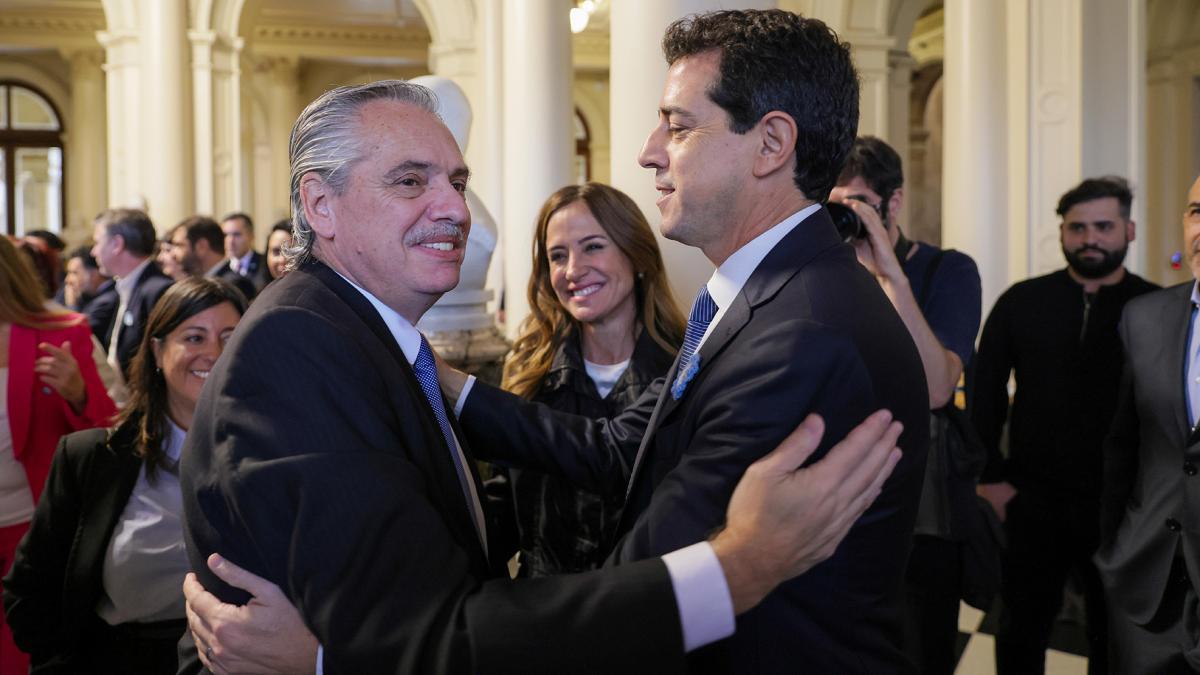 Photo: Presidency
Photo: Presidency
And he added: “I remember every detail and it also moved me at that time, the memory moved me.”
“I think that for all Argentines, May 25 is a day that should call us to unity, to meet, to reflect”Fernandez noted.
And he expressed the idea of ”understanding that we have problems to overcome, problems that multiply, such as the case of drought, which makes everything so difficult for the country’s economy, but that we have to be able to be together” and “to achieve the objectives we have together”.
On the other hand, he stated that “Also for those of us who are Peronists, we all have to be in the square remembering Néstor, because Néstor united us”in the act that will be led this afternoon by Vice President Cristina Fernández de Kirchner in Plaza de Mayo on the occasion of the 20th anniversary of the presidential inauguration of Néstor Kirchner.
“I’m not going to be there, but Néstor brought us together,” he clarified, and explained that “I’m not going to be in Buenos Aires, I’m finishing and I’m leaving,” after his presence at the Tedeum in the Metropolitan Cathedral, because “I have my family in Chapadmalal”.
When asked if he was upset at not having been summoned to the event, he replied “not at all” and asked that “we not look for a title so that we can fight” because “today we have to be more together than ever.”
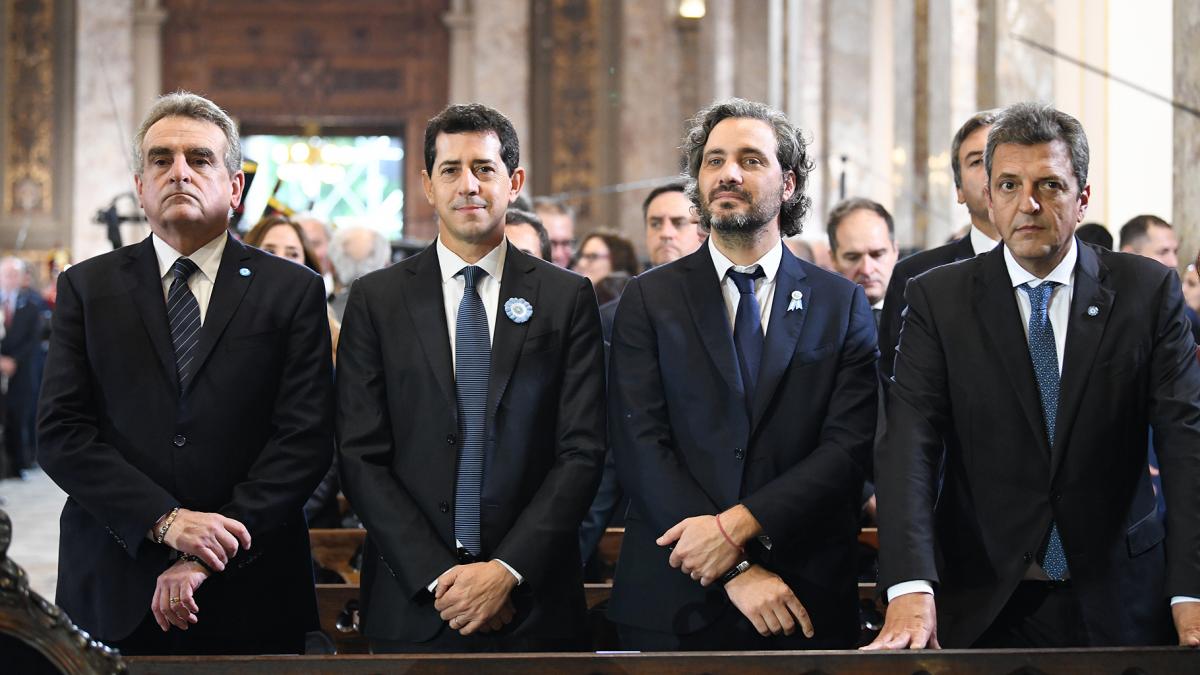 Photo: Presidency
Photo: Presidency
Poli called for “dialogue” between the presidential candidates and asked for “unity”
The Archbishop of Buenos Aires and Primate of Argentina, Mario Poli, affirmed this Thursday that “in the face of a new electoral process,” an unbeatable opportunity is being generated for the candidates to express their dedication to service and take advantage of their words to do democratic teaching, with clear and realistic proposals and without disqualifying those who compete” and also called for the “urgent unity of the Argentines”, by heading the Tedeum for the 223 years of the May Revolution of 1810.
“In the face of a new electoral process to elect those who aspire to lead the Nation, we see an unbeatable opportunity for the candidates to express their vocation for service and take advantage of their words to do democratic teaching, with clear and realistic proposals, without disqualifying those who compete; with a new language that promotes solidarity and restores the people’s trust and desire to participate in the construction of a common destiny,” said Cardinal Poli in his homily on May 25.
In the presence of President Alberto Fernández and several ministers of the national Cabinet and the head of the Buenos Aires Government, Horacio Rodríguez Larreta, in the Metropolitan Cathedral, the Archbishop of Buenos Aires sent a message to the politicians ahead of the next elections, recalling the words of Pope Francis, who considered that “politics is nobler than appearance, than marketing, than different forms of media make-up.”
“All of this the only thing it achieves is sowing division, enmity and a devastating skepticism incapable of appealing to a common project. We need to accept that every democracy suffers moments of conflict. In these complex situations, fuel the confrontation by looking for culprits in the past or in the future present, it may seem the easiest path, sowing mistrust and fueling more confrontations. But the wisest and most opportune way to prevent and address them is to seek consensus through dialogue,” Poli said.
And he continued: “We must humbly admit that if we speak of a weakening and discredit of our democracy, its causes must be found in the sum of shared responsibilities of all.”
During the homily, he pointed out that “even with all the limits of a system in human hands, our democratic regime has proven to be the most optimal order of civil life, guaranteeing freedoms, favoring inclusion processes and promoting social rights.”
In another passage of the message in the religious celebration, Poli made “an urgent call for unity” of the Argentines so that “everyone is one.”
“Although this exhortation was addressed to the first communities of believers in the face of the danger of fragmentation, the supreme value of unity does not exclude anyone, and its projection in history on human aspirations will always be an ideal to achieve,” he remarked. .
The primate of Argentina also cited the book Martín Fierro, by José Hernández, when he argued that “the iconic poetry par excellence of Argentines recorded in the popular memory the slogan: ‘Brothers be united because that is the first law'” .
Regarding the patriots of 1810, he maintained that “in a time of bewilderment and confusion, they remained united in an ideal that allowed them to overcome differences and persevere firm in the conviction of assuming the representation of an already mature people, to govern without guardianships an independent and sovereign homeland”.
“May 25 is not just another holiday for Argentines. It is the constitutive event of our identity; it forces us to remember it again, that is, to pass it through our hearts. If we do not remember gratefully where we come from, we will hardly be able to move towards where we want to go as a nation,” he stressed.
Poli assured that “this allowed us to overcome the great drama of the fratricidal war, know times of progress and peaceful coexistence, among many other achievements.”
“They are living pages of our cultural heritage and a permanent teaching chair that warn us that the desired unity prevails over conflict,” he said.
At the Tedeum, the Archbishop of Buenos Aires also stressed that “recent field studies” show “the sensitive inequality that exists in a broad sector of the most vulnerable population.”
“It is public information that six out of ten Argentine children and adolescents are poor and that percentage is seen more starkly if we consider that it reaches 8,200,000 minors, of which there are more than 4,200,000 with nutritional deficiencies” , he emphasized.


